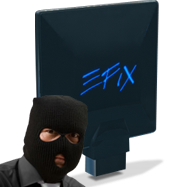 Tom's Hardware, September 8, 2009:
Tom's Hardware, September 8, 2009:
"There comes a time in history when dirty secrets will reveal themselves.
This happens to be the situation with a little known company called Art Studios Entertainment Media, or ASEM for short. The company is most famous for making a module called the EFI-X, which it claims to allow simplistic booting and running of Apple's Mac OS X. And that, it really did. Several media outlets, including us, last year received a batch of EFI-X modules and it certainly did what it claimed to be able to do.
Quite simply, one need only connect the EFI-X module onto a motherboard's USB header, boot the system, set the module as the default booting device, and go. Have a retail Mac OS X Leopard disc handy? Insert, and boot. Install, reboot and you're running OS X on a PC (using compatible hardware of course) almost perfectly--and this is where the problems really began.
Back last year when the modules were selling like hotcakes, people were thrilled that they didn't have to hack their own way to using OS X on their custom build PC. This was considered as the ultimate solution. At the time, the OSX86 community was already in full force with its own software solutions, namely Chameleon (based on PC EFI10) and Boot-132. While considerably much more difficult to put together, Chameleon and Boot-132 offer significantly more configuration options than EFI-X. Those who didn't know how to, or couldn't be bothered to spend time figuring out how, could cough up roughly $280 for an EFI-X module and be on their way.
When we tested our module, everything did work as claimed. However, not all users were able to get a 100-percent working system. Eventually, ASEM released a new firmware, but then things started breaking. For example, our onboard LAN no longer worked with Apple's Bonjour protocol. This meant that it couldn't see other Macs on the network (unless you directly connect), and iTunes couldn't share music. This problem, existed for a considerably long time. While there were solutions around it (like obtaining another standalone network card), it was frustrating.
As time went on, more problems were introduced while others were fixed. ASEM customers grew increasingly frustrated and voiced their concerns onto the forums. Unfortunately, many forums posts ended up being removed by the ASEM moderator team. Many users, also complained that their EFI-X 1.0 modules were dying after some time of use. Some customers were experiencing intermittent booting problems. Sometimes the module would be detected by the system BIOS, other times it wouldn't. After a while, the modules themselves would no longer be detected at all. Unfortunately, this also happened to three of our modules.
We, and everyone else, were told not to worry, as version 1.1 of the module would be able to address all these issues. Version 1.1 would include higher quality components, be gold plated, and include several other features to ensure compatibility and longevity. Why wasn't 1.0 made to higher quality standards to begin with? Some people were having dying modules. Then many. Then a whole lot. Eventually, customers were banned from voicing their concerns on ASEM's forums.
On the other side of the net, members of the OSX86 community suspected that the EFI-X module was nothing more than a repackaged Chameleon/Boot-132 bootloader placed onto a USB stick with DRM to prevent reverse engineering. Telltale signs included problems that also existed with the software bootloaders, as well as the same compatibility charts. Coincidentally, issues that were patched up in the OSX86 community became available on the EFI-X modules shortly after. Throughout all this, ASEM still denied any connection to Chameleon or Boot-132."
Continued at source